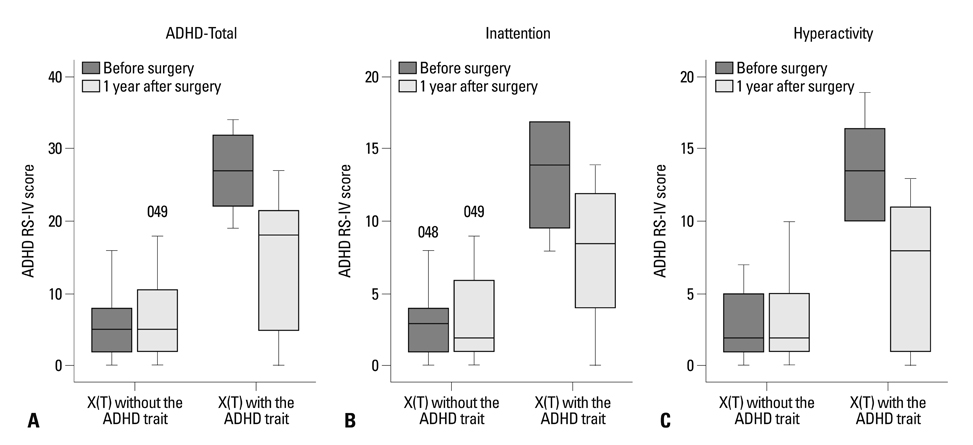Yonsei Med J.
2012 Jul;53(4):806-811. 10.3349/ymj.2012.53.4.806.
Parent-Reported Symptoms of Attention Deficit Hyperactivity Disorder in Children with Intermittent Exotropia before and after Strabismus Surgery
- Affiliations
-
- 1Department of Ophthalmology, Ajou University School of Medicine, Suwon, Korea.
- 2Institute of Vision Research, Department of Ophthalmology, Yonsei University College of Medicine, Seoul, Korea. 491209@yuhs.ac
- 3Department of Ophthalmology, CHA University College of Medicine, Bundang CHA Hospital, Seongnam, Korea.
- KMID: 1716882
- DOI: http://doi.org/10.3349/ymj.2012.53.4.806
Abstract
- PURPOSE
To investigate the symptoms of attention deficit hyperactivity disorder (ADHD) as reported by parents in children with intermittent exotropia [X(T)] and to determine whether strabismus surgery for X(T) affects ADHD symptoms.
MATERIALS AND METHODS
Fifty-one consecutive children undergoing muscle surgery for X(T) were prospectively recruited. One parent of each child completed the ADHD rating scale IV (ADHD RS-IV) assessment consecutively before and one year after surgery. Patients whose preoperative scores were above the cut-off point, the 90th percentile based on a Korean sample, were regarded as demonstrating the ADHD trait. The impact of muscle surgery on ADHD symptoms was assessed by comparing the preoperative scores with the post-operative scores.
RESULTS
Eight (15.7%) of the 51 patients demonstrated the ADHD trait. ADHD RS-IV scores following strabismus surgery significantly decreased in patients with the ADHD trait (p=0.014), while they did not differ in patients without the ADHD trait. Seven (87.5%) of the 8 patients with the ADHD trait showed improvement in their ADHD RS-IV scores after surgery. There was no difference in surgical success rates between X(T) patients with and without the ADHD trait.
CONCLUSION
The ADHD trait was relatively common in children with X(T), and the parent-reported symptoms of the children with the ADHD trait improved after strabismus surgery. These results suggest that childhood X(T) may be one contributing factor to ADHD-related symptoms.
MeSH Terms
Figure
Reference
-
1. Hatt SR, Leske DA, Adams WE, Kirgis PA, Bradley EA, Holmes JM. Quality of life in intermittent exotropia: child and parent concerns. Arch Ophthalmol. 2008. 126:1525–1529.2. Wright K. Wright K, editor. Exotropia. Pediatric Ophthalmology and Strabsimus. 1995. 2nd ed. St Louis: Mosby Year Book;195–202.
Article3. Santiago AP, Ing MR, Kushner BJ, Rosenbaum AL. Rosenbaum AL, Santiago AP, editors. Intermittent exotropia. Clinical Strabismus Management: Principles and Surgical Techniques. 1999. Philadelphia: WB Saunders Co.;163–175.
Article4. von Noorden GK. von Noorden GK, Campos EC, editors. Exodeviations. Binocular Vision and Ocular Motility Theory and Management of Strabismus. 2002. 6th ed. St Louis: Mosby;356–376.5. Paysse EA, Steele EA, McCreery KM, Wilhelmus KR, Coats DK. Age of the emergence of negative attitudes toward strabismus. J AAPOS. 2001. 5:361–366.
Article6. Uretmen O, Egrilmez S, Kose S, Pamukçu K, Akkin C, Palamar M. Negative social bias against children with strabismus. Acta Ophthalmol Scand. 2003. 81:138–142.
Article7. Archer SM, Musch DC, Wren PA, Guire KE, Del Monte MA. Social and emotional impact of strabismus surgery on quality of life in children. J AAPOS. 2005. 9:148–151.
Article8. Mruthyunjaya P, Simon JW, Pickering JD, Lininger LL. Subjective and objective outcomes of strabismus surgery in children. J Pediatr Ophthalmol Strabismus. 1996. 33:167–170.
Article9. Borsting E, Rouse M, Chu R. Measuring ADHD behaviors in children with symptomatic accommodative dysfunction or convergence insufficiency: a preliminary study. Optometry. 2005. 76:588–592.
Article10. Granet DB, Gomi CF, Ventura R, Miller-Scholte A. The relationship between convergence insufficiency and ADHD. Strabismus. 2005. 13:163–168.
Article11. Rouse M, Borsting E, Mitchell GL, Kulp MT, Scheiman M, Amster D, et al. Academic behaviors in children with convergence insufficiency with and without parent-reported ADHD. Optom Vis Sci. 2009. 86:1169–1177.
Article12. Buck D, Powell C, Cumberland P, Davis H, Dawson E, Rahi J, et al. Presenting features and early management of childhood intermittent exotropia in the UK: inception cohort study. Br J Ophthalmol. 2009. 93:1620–1624.
Article13. Robaei D, Rose KA, Kifley A, Cosstick M, Ip JM, Mitchell P. Factors associated with childhood strabismus: findings from a population-based study. Ophthalmology. 2006. 113:1146–1153.14. Mohney BG, McKenzie JA, Capo JA, Nusz KJ, Mrazek D, Diehl NN. Mental illness in young adults who had strabismus as children. Pediatrics. 2008. 122:1033–1038.
Article15. Goldman LS, Genel M, Bezman RJ, Slanetz PJ. Council on Scientific Affairs, American Medical Association. Diagnosis and treatment of attention-deficit/hyperactivity disorder in children and adolescents. JAMA. 1998. 279:1100–1107.
Article16. Kim YS, So YK, Noh JS, Choi NK, Kim SJ, Koh YJ. Normative data on the Korean ADHD Rating Scales (K-ARS) for parents and teacher. J Korean Neuropsychiatr Assoc. 2003. 42:352–359.17. Kim JW, Park KH, Choi MJ. Screening for attention deficit/hyperactivity disorder in community mental health services for children. J Korean Neuropsychiatr Assoc. 2004. 43:200–208.
- Full Text Links
- Actions
-
Cited
- CITED
-
- Close
- Share
- Similar articles
-
- Attention Deficit Hyperactivity in Exotropia Before and After Strabismus Surgery
- A Case Report of a Child who has Attention Deficit Hyperactivity Disorder, Mental Retardation, and Mania
- The Predictors of Parent Reported Behaviors Related to Olfactory Information Processing in Children with ADHD
- Non-Stimulant Medications in the Treatment of Attention-Deficit Hyperactivity Disorder
- Consecutive Cyclic Esotropia Developing after Strabismus Surgery for Intermittent Exotropia


